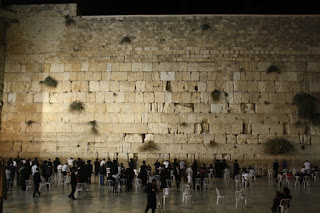THE TEMPLE OF JERUSALÉM
In the context of Yahweh's
appearances to Moses during the wilderness pilgrimage, He commanded that
prophet to build a tabernacle: "Then have them make a sanctuary for me,
and I will dwell among them" (Exodus 25: 8). In it was the ark and within
it the tablets of the Law. "There, above the cover between the two
cherubim that are over the ark of the covenant law, I will meet with you and
give you all my commands for the Israelites" , God said to Moses (Exodus
25:22). At the time of David (1 Chronicles 22: 1-6), nearly five centuries
later, the tabernacle was replaced by a sumptuous temple erected by his son
Solomon (1 Kings6).
Over time, sin and distancing from
God led the Jews to view the ark of the covenant and the temple as amulet
species. Once, when they suffered heavy defeat against the Philistines, they
sent for the ark of the covenant, because they believed that their mere
presence would lead them to victory. However, this is not what happened: they
were defeated again (1 Samuel 4:1-11). The narrative of the text shows that the
Israelites were, in relation to God, with the same pagan view that the
Philistines had about their gods. They believed that "the deity is
identified with the symbol of his presence and that the favor of God can be
automatically obtained by manipulating the symbol" [1].
Still in this regard, Jeremiah shows
that, despite the life of sin, there was in his day the same sense of
protection because of the temple's existence in Jerusalem. But the prophet
warned them, "Reform your ways and your actions, and I will let you live
in this place. Do not trust in deceptive words and say, “This is the temple of
the Lord, the temple of the Lord, the temple of the Lord!" (7: 1-15).
Later, God, through this prophet, said, "I will make this house like
Shiloh and this city a curse among all the nations of the earth.’" (26:
6). It was in Shiloh that the tabernacle lay after the conquest of Canaan, but
was later destroyed. Likewise, in the year 586 BC, Jerusalem and the temple
were destroyed by the king of Babylon.
At the time of Jesus, the same
idolatrous attitude toward the temple was observed. Jesus condemned this
behavior and the model of spirituality professed by those who administered it
(Matthew 21:12, 13 and Matthew 23). He even prophesied his destruction (Matthew
24: 1-2). In one of his teachings, referring to himself, He said, "I tell
you that here is what is greater than the temple." In another discourse He
said, "Destroy this temple, and I will raise it again in three days… But
the temple he had spoken of was his body” (John2:19-21). Only God is worthy of
worship. The temple of Christ's time was not fully completed until AD 64 [2],
six years before its complete destruction by the Roman armies.
Of course there is no problem with
temples and other religious symbols. They even have a positive function when
they awaken man, immersed in a concrete reality, to spiritual life. The problem
is putting these icons on the same level as Godhead and worshiping them or
having extreme reverence for them. This is dead religiosity, idolatry. Jesus'
proposal is a spirituality that lives inwardly, inwardly, and projects itself
outwardly by acts of righteousness. The Apostle Paul, speaking about the
spiritual life, said: "Do you not know that your bodies are temples of the
Holy Spirit, who is in you, whom you have received from God?..." (1
Corinthians 6:19). The worship of God must take place, rather, within us, on
the altar we have raised to him in our minds and hearts.
In conversation with a Samaritan
woman, Jesus said that the place of worship is irrelevant. What counts is the
form, which must be "in spirit and in truth ... God is spirit" (John
4: 19-24). From the time of the prophets one observes the nullity of the temple
if the worship is not true. Also noteworthy is the fact that in the “new
Jerusalem”, which descends from heaven in Revelation, there is no temple. See
text: “I did not see a temple in the city, because the Lord God Almighty and
the Lamb are its temple.” (21:22). These reflections require us to evaluate our
religious expression. Attention should be paid to what James the brother of
Jesus said about true religion, the spirituality that pleases God: "to
look after orphans and widows in their distress and to keep oneself from being
polluted by the world". He was just quoting the two greatest commandments
differently: love your neighbor and love God.
Antônio Maia - M. Div.
Copyright reserved
[1] Bíblia Nova Versão Internacional,
Comentário, Ed Vida, pg.424
[2] Idem, p.1791



Comments
Post a Comment